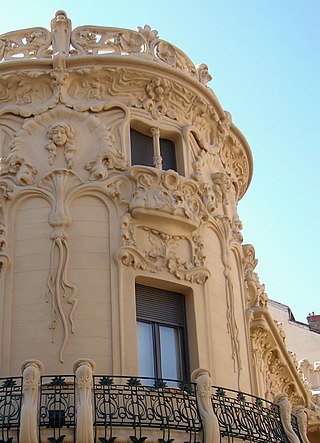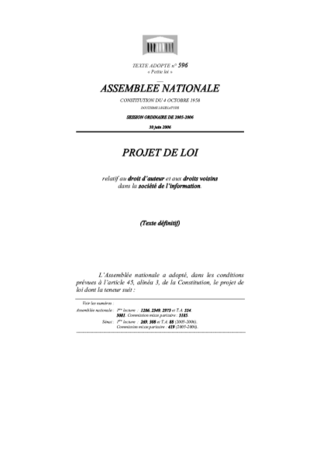
A copyright is a type of intellectual property that gives the creator of an original work,or another right holder,the exclusive and legally secured right to copy,distribute,adapt,display,and perform a creative work,usually for a limited time. The creative work may be in a literary,artistic,educational,or musical form. Copyright is intended to protect the original expression of an idea in the form of a creative work,but not the idea itself. A copyright is subject to limitations based on public interest considerations,such as the fair use doctrine in the United States.

Intellectual property (IP) is a category of property that includes intangible creations of the human intellect. There are many types of intellectual property,and some countries recognize more than others. The best-known types are patents,copyrights,trademarks,and trade secrets. The modern concept of intellectual property developed in England in the 17th and 18th centuries. The term "intellectual property" began to be used in the 19th century,though it was not until the late 20th century that intellectual property became commonplace in most of the world's legal systems.

Criticism of copyright,or anti-copyright sentiment,is a dissenting view of the current state of copyright law or copyright as a concept. Critics often discuss philosophical,economical,or social rationales of such laws and the laws' implementations,the benefits of which they claim do not justify the policy's costs to society. They advocate for changing the current system,though different groups have different ideas of what that change should be. Some call for remission of the policies to a previous state—copyright once covered few categories of things and had shorter term limits—or they may seek to expand concepts like fair use that allow permissionless copying. Others seek the abolition of copyright itself.

The history of copyright starts with early privileges and monopolies granted to printers of books. The British Statute of Anne 1710,full title "An Act for the Encouragement of Learning,by vesting the Copies of Printed Books in the Authors or purchasers of such Copies,during the Times therein mentioned",was the first copyright statute. Initially copyright law only applied to the copying of books. Over time other uses such as translations and derivative works were made subject to copyright and copyright now covers a wide range of works,including maps,performances,paintings,photographs,sound recordings,motion pictures and computer programs.
Ripping is extracting all or parts of digital content from a container. Originally,it meant to rip music out of Commodore 64 games. Later,the term was used to mean to extract WAV or MP3 format files from digital audio CDs,but got applied as well to extract the contents of any media,including DVD and Blu-ray discs,and video game sprites.
Software copyright is the application of copyright in law to machine-readable software. While many of the legal principles and policy debates concerning software copyright have close parallels in other domains of copyright law,there are a number of distinctive issues that arise with software. This article primarily focuses on topics particular to software.
The Copyright Act is the federal statute governing copyright law in Canada. It is jointly administered by the Department of Industry Canada and the Department of Canadian Heritage. The Copyright Act was first passed in 1921 and substantially amended in 1988 and 1997. Several attempts were made between 2005 and 2011 to amend the Act,but each of the bills failed to pass due to political opposition. In 2011,with a majority in the House of Commons,the Conservative Party introduced Bill C-11,titled the Copyright Modernization Act. Bill C-11 was passed and received Royal Assent on June 29,2012.
A copyright is the legal protection extended to the owner of the rights in an original work. Original work refers to every production in the literary,scientific,and artistic domains. The Intellectual Property Office (IPOPHL) is the leading agency responsible for handling the registration and conflict resolution of intellectual property rights and to enforce the copyright laws. IPOPHL was created by virtue of Republic Act No. 8293 or the Intellectual Property Code of the Philippines which took effect on January 1,1998,under the presidency of Fidel V. Ramos.

The Spanish Society of Authors and Publishers is the main collecting society for songwriters,composers and music publishers in Spain. It is similar to AGADU,ASCAP,GEMA,SADAIC,SACEM and SAYCO. The philologist,poet,composer,scriptwriter,movie and television director and producer Antón Reixa (1957) is the chairman of the Board of Directors since May 2012. SGAE was founded in 1889 as Society of Authors of Spain. In 1995,its name changed to Society of Authors and Publishers,seeking to accommodate cultural editors.

Loi DADVSI is the abbreviation of the French Loi relative au droit d’auteur et aux droits voisins dans la sociétéde l’information. It is a bill reforming French copyright law,mostly in order to implement the 2001 Information Society Directive,which in turn implements a 1996 WIPO treaty.
Spanish copyright law,or authors' right law,governs intellectual property rights that authors have over their original literary,artistic or scientific works in Spain. It was first instituted by the Law of 10 January 1879,and,in its origins,was influenced by French authors' right law and by the movement led by Victor Hugo for the international protection of literary and artistic works. As of 2006,the principal dispositions are contained in Book One of the Intellectual Property Law of 11 November 1987 as modified. A consolidated version of this law was approved by Royal Legislative Decree 1/1996 of 12 April 1996:unless otherwise stated,all references are to this law.
Crown copyright is a type of copyright protection. It subsists in works of the governments of some Commonwealth realms and provides special copyright rules for the Crown,i.e. government departments and (generally) state entities. Each Commonwealth realm has its own Crown copyright regulations. There are therefore no common regulations that apply to all or a number of those countries. There are some considerations being made in Canada,UK,Australia and New Zealand regarding the "reuse of Crown-copyrighted material,through new licences".
Japanese copyright laws consist of two parts:"Author's Rights" and "Neighbouring Rights". As such,"copyright" is a convenient collective term rather than a single concept in Japan. Japan was a party to the original Berne convention in 1899,so its copyright law is in sync with most international regulations. The 1899 law protected copyrighted works for 30 years after the author's death. Law changes promulgated in 1970 extended the duration to 50 years. However,in 2004 Japan further extended the copyright term to 70 years for cinematographic works;for films released before 1971,the copyright term also spans 38 years after the director's death.
The copyright law of Australia defines the legally enforceable rights of creators of creative and artistic works under Australian law. The scope of copyright in Australia is defined in the Copyright Act 1968,which applies the national law throughout Australia. Designs may be covered by the Copyright Act as well as by the Design Act. Since 2007,performers have moral rights in recordings of their work.
The philosophy of copyright considers philosophical issues linked to copyright policy,and other jurisprudential problems that arise in legal systems' interpretation and application of copyright law.
Under the law of the United Kingdom,a copyright is an intangible property right subsisting in certain qualifying subject matter. Copyright law is governed by the Copyright,Designs and Patents Act 1988,as amended from time to time. As a result of increasing legal integration and harmonisation throughout the European Union a complete picture of the law can only be acquired through recourse to EU jurisprudence,although this is likely to change by the expiration of the Brexit transition period on 31 December 2020,the UK has left the EU on 31 January 2020. On 12 September 2018,the European Parliament approved new copyright rules to help secure the rights of writers and musicians.
The copyright law of Chile is governed by Law No. 17,336,on Intellectual Property of October 2 of 1970 and subsequent amendments. It was implemented in the Decree No. 1122 of the Ministry of Education of Chile on May 17 of 1971.

The Fairness in Music Licensing Act increased the number of bars and restaurants that were exempted from needing a public performance license to play music or television during business hours. The bill was companion legislation passed along with the Copyright Term Extension Act in 1998.
The copyright law of South Africa governs copyright,the right to control the use and distribution of artistic and creative works,in the Republic of South Africa. It is embodied in the Copyright Act,1978 and its various amendment acts,and administered by the Companies and Intellectual Property Commission in the Department of Trade and Industry. As of March 2019 a major amendment to the law in the Copyright Amendment Bill has been approved by the South African Parliament and is awaiting signature by the President.

Javier de la Cueva,is a lawyer specialized in issues related to technology and the Internet. He graduated in Law and is Doctor in Philosophy from the Complutense University of Madrid. He has defended numerous cases involving the use of free licenses of intellectual property.






